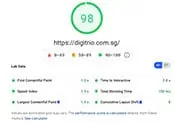Major Google Algorithm Updates 2024 (Simplified)
In the dynamic world of SEO, change is inevitable. Google is known to tweak its algorithm daily, leading to approximately 365 updates every year. However, it's the major updates that truly shake things up and demand our attention.
Major Google algorithm updates are changes to the search engine that will likely affect the search engine results page. Google updates aim to improve their search results and as a result they want to rank higher sites that are relevant, high quality, up to date and unique. By grasping the essence of each major update, you can ensure your website aligns with Google's criteria. This will prevent your site from falling out of favor and suffering a drop in rankings.
For real-time status updates on Google Search, check out the Google Search Status Dashboard.

Significant Google Algorithm Updates
Below are the significant algorithm updates made by Google for its search engine.

2011
Panda
Google Panda is an algorithm update introduced by Google in 2011. Its aim was to enhance the quality of search results by penalizing websites with low-quality or thin content and rewarding high-quality websites with improved rankings. The update impacted approximately 12% of search results.

2012
Penguin
Google Penguin is an algorithm update introduced by Google in 2012. Its purpose was to penalize websites violating Google's Webmaster Guidelines through black hat SEO techniques, such as keyword stuffing, cloaking, and link schemes, which manipulate search engine rankings. The update impacted approximately 3.1% of search queries.

2013
Hummingbird
Google Hummingbird update is an algorithm update that was introduced by Google in 2013. Unlike previous updates, this was a complete overhaul of the search algorithm. It is designed to improve the accuracy and relevance of search results by focusing on the meaning behind the search query rather than just the keywords. The impact of the update was not revealed.

2015
Mobile
Google's Mobile update is an algorithm update that was released in 2015. It was introduced to focus on giving a boost to mobile-friendly websites in smartphone search results. The exact impact of the results was not revealed, but it was said to have a more significant impact than Panda and Penguin, which affected 12% and 3% of search results, respectively.

2015
RankBrain
Google RankBrain is an algorithm update introduced by Google in 2015. It is a component of Google's core algorithm that uses artificial intelligence and machine learning to determine the most relevant results to search engine queries it is used to "teach" the RankBrain algorithm on queries that Google has not encountered before.

2018
Medic
Google Medic is an algorithm update introduced by Google in 2018. The purpose of the Medic update was to emphasize and enhance the expertise, authority, and trustworthiness (E-A-T) of pages with the potential to impact a person's well-being and happiness. It was dubbed "Medic" by SEO expert Barry Schwartz because it predominantly affected health, medical, fitness, and healthy lifestyle websites.

2019
Bert
The Google BERT update, which stands for Bidirectional Encoder Representations from Transformers, is an algorithm enhancement introduced by Google in 2019. It represents a significant leap in the evolution of search algorithms due to its ability to understand the context of words in a sentence and their relationship to one another. This update is anticipated to impact 1 in 10 search queries.

ONGOING
Core
The Google core update is an ongoing series of significant changes that Google implements in its ranking algorithm. These alterations influence a vast number of indexed web pages. Google has been releasing multiple core updates every year since at least 2018. These core updates can take several weeks to fully roll out and can significantly impact search rankings.

ongoing
Helpful Content Update
Google Helpful Content is an algorithm update introduced by Google in mid of 2022. This update is designed to reward websites that produce high-quality content written for people, rather than for search engines.

Google Core Update — 2th November 2023
Following the October core update, Google rolled out another core update on November 2nd, 2023, focusing on enhancing search result quality and relevance, with an emphasis on high-quality content and user experience. This update concluded on November 28th.

Google Core Update — 5th October 2023
Google released another core update to its search system in October 2023, following its August 2023 update. It began on October 5th and was fully implemented by October 19th. This update may have affected how some websites rank in search results.

Google Spam Update — 4th October 2023
The Google October 2023 spam update is an update to Google Search aimed at improving its ability to detect and filter spam. This particular update was applied globally and enhanced the search engine's coverage in multiple languages, including Turkish, Vietnamese, Indonesian, Hindi, Chinese, and more. The rollout began on October 4, 2023, and was completed by October 20, 2023.

Google Helpful Content Update — 14th September 2023
Google has rolled out another "helpful content" update designed to reward websites that produce high-quality content written for people. The main changes are that Google has amended the guidelines to state: "Ensure people see original, helpful content written by individuals, for people, in search results." Google removed the words "written by people" and simply stated "helpful content created for people in search results.

Google Core Update — 22th August 2023
Google has rolled out another core update that aims to improve the quality and relevance of search results. It has been completed as of 7th September 2023.

Google Core Update — 15th March 2023
Google Core updates make significant changes to how it evaluates the relevance and quality of search results for users, and are not specifically targeted at any one area. The rollout of these updates typically takes around two weeks to complete.

Unknown Update — 14th January 2023
The Unknown Update target appears to be the result of helpful content update and spam link update.

Link Spam Update — 14th December 2022
The Link Spam Update target and penalize websites that use manipulative and spammy link-building tactics. These changes are intended to improve the overall quality of search results by reducing the visibility of low-quality sites and promoting those that provide valuable and relevant content.

Helpful Content Update — 25th August 2022
The Helpful Content Update was created to encourage content that puts "people first" and devalue content written mainly for SEO purposes. It officially rolled out over the course of two weeks from 25th August 2022.

Page Experience Update (Desktop) — 22nd February 2022
Google announced that the Page Experience Update, which was first seen on mobile SERPs (June 2021), would be appearing on desktop devices too.

Product Reviews Update — 1st Dec 2021
Google is always working to show the most helpful and useful information possible. So now, when people search for a product, we'll show more reviews from experts, instead of just the first few results.

Google Link Spam Update — 26th July 2021
This update is about improving the effectiveness at identifying and nullifying link spam more broadly which will affect the ranking of the sites and will roll out over a 2 weeks period.

Google Page Experience Update — 25th June 2021
This update is about Core Web Vitals which Google continues to enhance on what they consider as a good user experience, having a fast loading website speed.

Google Core Update — 3rd December 2020
This core update is a classic “broad core update” that Google releases every few months or so that re-evaluate the ranking factors of the sites.

Featured Snippet De-duping — 22th January 2020
Featured Snippets would no longer be appearing as below the tradtional organic results if it is being used in the featured box (Position 0)

BERT Update — 22th October 2019
BERT update is 1 of the major update to Google algorithms in the last 5 years. To simplify it, it basically change the way the search engine intepret the search terms and its context. More info @ Search Engine Journal.

June Core Update — 3rd June 2019
Google pre-confirmed an “core algorithm update,” in the month of June. Thus, with no name given to it – the community has decide to name it: June Core Update.

“Medic” Core Update – 1st August 2018
Google confirmed a “broad core algorithm update,” with wide reports of massive impact. It mainly affected a lot of sites in the health industry, thus the name of “Medic” core updates.

Mobile First Indexing Update — 26th March 2018
Google announced that they will be indexing the mobile version of the website first, taking a mobile-first index approach. Thus, striving an importance on having a mobile website.

"Maccabees ” Update (Formerly known as Fred — 10th December 2017
Barry Schwartz of SERoundtable named it Maccabees in recognition of Hanukkah. Google spokesperson mentioned that the changes are meant to improve relevancy, but not much details are mentioned.

“Fred” Update — 8th March 2017
Google rolled out a major update, with reports of widespread impacts across the SEO community. When asked, Gary Illyes of Google jokingly referred to as “Fred” update and the name has been stuck ever since.

Penguin 4.0 (Real time) – 23th September 2016
Google Penguin 4.0 After a much-awaited 2-year gap, Google has rolled out Penguin 4.0. This will be the last update in Penguin as it will now run in real-time and is also more granular.

Unnamed Update (aka John Doe update) – 8th January 2016
Google introduced an update but details remain sketchy on what is it all about. They only confirmed it as a “Core Algorithms Update”.

RankBrain – 26th October 2015
Google introduced a new ranking signal called RankBrain, which uses machine learning and artificial intelligence to deliver better search results. This covers all languages and is mainly used for the 15% of everyday search queries which Google hasn’t seen before.

Panda 4.2 Update – 17th July 2015
Another Panda Update was officially confirmed . The only difference this time was that it was a slow roll out, and took as long as a couple of months.

Mobile Friendly Update – 21st April 2015
Google made an official update announcement on their Google Webmaster Blog. This change affected mobile searches in all languages worldwide and also had a significant impact on mobile search results.

Penguin 3.0 – 17th October 2014
Google launched another Penguin refresh. This update appeared to be smaller than expected (<1% of US/English queries affected).

Panda 4.1 – 23th September 2014
Google announced another significant Panda update, which included an algorithmic component. It was estimated to affect around 3-5% of queries.

Pigeon – 24th July 2014
The Pigeon update focused on local SEO to dramatically alter some local results and modify how they handle and interpret location cues.

Hummingbird – 24th August 2013
The Hummingbird update was a major overhaul to the all-important concept of semantics, or meaning. It was rolled out to combat the increasing longer search queries key in searches.

Penguin – 24th April 2012
The Penguin update was a major algorithm that targeted sites spamming its search results, in particular those doing so by buying links or obtaining them through link networks designed primarily to boost Google rankings.

Panda – 23th February 2011
The Panda update was a major algorithm update which hit sites hard, affecting up to 12% of search results (a number that came directly from Google). Panda is mainly focused on low-quality (thin) content, sites with high ad-to-content ratios, and a number of other quality issues.

Caffeine – June 2010
The Caffeine update was a refreshment to Google’s infrastructure which not only boosted Google’s raw speed, but integrated crawling and indexation much more tightly, resulting in (according to Google) a 50% fresher index.

Big Daddy – December 2005
The Big Daddy update was an infrastructure update which changed the way Google handles URL canonicalization, redirects (301/302) and other technical issues.

Florida – November 2003
The Florida update was the death of low-value late-90s SEO tactics, such as keyword stuffing.


